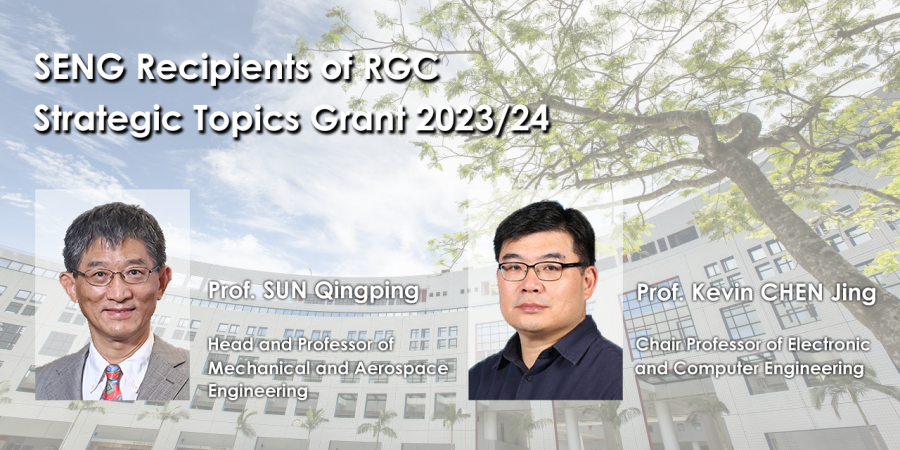Two SENG-led Research Projects Awarded HK$58 Million in RGC Strategic Topics Grant 2023/24
Two research projects led by Prof. SUN Qingping and Prof. Kevin CHEN Jing respectively have secured over HK$58 million* in total in the first round of the Research Grants Council’s (RGC) Strategic Topics Grant (STG).
A new funding scheme launched in 2022, the Strategic Topics Grant supports collaborative and interdisciplinary research at University Grants Committee-funded universities to address Hong Kong’s imminent challenges and seize the opportunities offered by the National 14th Five-Year Plan.
Of the 29 preliminary proposals received in the 2023/24 exercise, only six were eventually supported by an overall budget of HK$166 million* after a thorough and rigorous assessment process. The selected proposals cover a wide range of research areas, including artificial intelligence in healthcare, carbon neutrality, integrated circuits, opto-electronics innovation and technology, and public health.
The main feature of the STG scheme is its top-down approach that focuses the strengths of diverse disciplines on specified priority research areas pertinent to the strategic needs of Hong Kong. Five strategic topics are set under the scheme.
Led by Prof. Sun Qingping (Project Coordinator), Head and Professor of Mechanical and Aerospace Engineering, the project titled “Decarbonization Solutions for Buildings in Hong Kong: Development, Assessment and Deployment” was allocated HK$34.377 million*, under the topic of “Striving toward Carbon Neutrality before 2050”.
Adopting a systems-based and problem-driven collaborative approach, the study aims to (1) identify and develop promising building technologies according to their efficacy and viability, for maximizing carbon reduction and energy efficiency, and (2) integrate the developed innovative technologies with net-zero policies and regulations in the built sector, and to provide a feasible and accountable roadmap to the Hong Kong government for implementation.
The research team comprises leading experts in environmental and mechanical engineering, materials science and engineering, and public policy from HKUST, PolyU and CityU, along with key stakeholders from the Environmental Protection Department of the HKSAR Government and Hong Kong Green Building Council.
The research will advance the existing knowledge and hardware-software for the building sector, promote the reshaping of Hong Kong’s building industry, and eventually establish the city as an international center of excellence in this field.
Another project titled “Technology for Next Generation Wide-/Ultrawide-bandgap Semiconductor Integrated Electronics”, led by Prof. Kevin CHEN Jing (Project Coordinator), Chair Professor of Electronic and Computer Engineering, received HK$23.759 million* in the scheme.
With wide-bandgap (WBG) and ultrawide-bandgap (UWBG) semiconductors emerging as the materials of choice for next-generation high-efficiency and high-power-density power conversion systems in the integrated circuits (IC) industry, the research team proposes to undertake focused research on WBG and UWBG semiconductor integrated electronics by developing solutions to the most challenging problems to facilitate their deployment in the more performance- and reliability-demanding applications and expand space for new applications.
Known for conducting groundbreaking research with industry impact, the internationally recognized team comprises HKUST faculty members from the Departments of Electronic and Computer Engineering, Mechanical and Aerospace Engineering, and Physics.
The project focuses on the topic of “Establishing Hong Kong as the Leading Integrated Circuits, and Opto-electronics Innovation and Technology Hub in the Guangdong-Hong Kong-Macao Greater Bay Area”. It aims to establish Hong Kong as an innovation hub for WBG and UWBG semiconductor research in the GBA, which offers a unique combination of a strong corporate R&D sector, world-leading electronics manufacturing capabilities, and top-tier industrial end users.
The other four selected proposals in STG 2023/24 include two led by HKU, one by CUHK, and one by PolyU.
*Includes RGC funding and matching funds from the universities involved
Related link:
- RGC press release (July 18, 2023): RGC announces funding results of Strategic Topics Grant 2023/24
- RGC press release (Aug 8, 2022): Research Grants Council allocates $150 million for launch of Strategic Topics Grant

